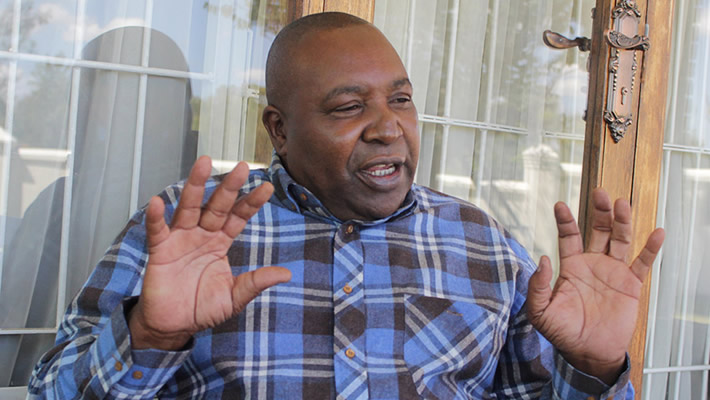By Farirai Machivenyika
HARARE – The Zimbabwe Broadcasting Corporation was prejudiced of close to $25 million by the previous board and management between 2009 and 2013, a forensic audit carried out by KPMG Chartered Accountants presented to Parliament yesterday has revealed.

During the period, ZBC was chaired by Cuthbert Dube while Happison Muchechetere was the chief executive officer. They have both been fired.
The audit accuses Muchechetere and four other senior managers, Elliot Kasu (General Manager, Finance), Tazzen Mandizvidza (General Manager, News and Current Affairs), Allan Chiweshe (General Manager, Radio Services) and Ralph Nyambudzi (Head of Finance) of abusing the broadcaster’s funds.
The managers have since been suspended, while Muchechetere and Kasu also face criminal proceedings in the courts.
The report was presented by the Minister of Information, Media and Broadcasting Services Professor Jonathan Moyo in a joint sitting of the Portfolio Committees on Media, Information and Broadcasting Services and that of Information Communication Technology, Postal and Courier Services.
“The audit found that the total prejudice to ZBC amounted to $24,968,647,18 and broken down as indicated — the board $274,486 the managers $6,724, 322, 82,” said Prof Moyo.
“This is what the senior management, executive management pocketed unlawfully and unprocedurally and then statutory funds and interest instruments amounting to $15,538,658,41 and then there was some other prejudice arising from poor barter deals of $450,055.
“On broadcasting archival material which is a serious source revenue, there was prejudice to the tune of $419,346. Then there was the issue of the OB van pricing, overpricing it to the tune of $786,283 and $133,733 in sundry.
“The problem areas are six and they are deliberate disregard of statutory provisions, operating losses, policies for key areas inadequate or non-existent, inconsistent and inefficient procurement, lack of good governance and prejudice to ZBC for personal gain or mismanagement.”
Apart from those amounts, ZBC also owed Zimra $14,751,567 in the period under review.
Muchechetere received a basic salary of $15,000, retention allowance of 50 percent of basic salary, amenities allowances of 35 percent of basic salary, entertainment allowance of 20 percent of basic salary, 100 percent medical aid contribution cover by the company, gym membership, an annual bonus plus a quarterly performance-related bonus of 12.5 percent of annual basic salary upon meeting set targets.
He also received an S350 Mercedes Benz and a Toyota Landcruiser that he was entitled to buy if he left ZBC, a $3,500 housing allowance while his housing mortgage of $195,624 was taken over by the organisation.
The other three general managers received a basic salary of $11,000, while their retention, amenities and entertainment allowances were also pegged at 50 percent, 35 percent and 20 percent of basic salary, among other benefits.
The audit also showed that Muchechetere had other perks that included full payment of telephone bills, 24-hour security guard, five and three business class return air tickets for international and regional holiday destinations and spending allowances, including for family members per year.
Kasu, Mandizvidza and Chiweshe and their immediate families were entitled to one international and regional business class return air tickets, including spending allowances, food and accommodation.
The executive also enjoyed 100 percent payment of school fees for not more than three children, including for local universities and colleges and 50 percent payment for children at universities and colleges in the Sadc region.
In the report, KPMG said the executives and board members enjoyed generous perks at a time the broadcaster was failing to pay the general employees.
“At a time when ZBC was failing to pay its salaries between January 2013 and 31 December 2013, the top four management were withdrawing relatively significant amounts of money as salary advances as follows, Muchechetere $58,200, Kasu $50,985, Chiweshe $59,900, Mandizvidza $51,470,40 and Nyambudzi $64,947,” the report reads.
The top managers were also provided with unlimited amounts of fuel and in 2013, Muchechetere received 11,298 litres, Kasu 10,364 litres, Mandizvidza 8,706 litres, Chiweshe 13,116 litres and Nyambudzi 10,083 litres.
“Allowances that were outside contracts included amenities and retention allowances that were paid to the executives from 2009 to 2013 as follows; Muchechetere $400,895,92, Mandizvidza $254,452,71, Chiweshe $292,376,10, Kasu $292,376,10,” added the report.
The report noted that the board members also received fees that were higher than those approved, prejudicing ZBC of $274,486.
“The terms and conditions given to the four managers were quite generous in relation to the financial performance of ZBC as well as the general market conditions,” the report reads. “There is no evidence that these contracts were approved by the board’s remuneration committee.
“Benefits given to the four executives were significantly different from other managers and staff. The top four executives’ (plus Nyambudzi) remuneration amounted to $6,132,403, making up 10 percent of the total staff costs of $59,944,025.”
Prof Moyo said the outcome of the audit showed that ZBC was in need of government support if it were to survive, with its debt standing at over $66 million at the time the audit report was produced in November last year.
“If you look at this, you’ll find that obviously ZBC is technically insolvent and ZBC is a national broadcaster and it’s our responsibility to help ZBC,” he said.
“ZBC will not be able to discharge its national role against the background of this audit without government assisting it in a particular way, a focused way.
“It’s very necessary for us working together, government and parliament, to support ZBC, including considering very seriously assuming the debt of ZBC so that they start on a clean slate in the digital era.
“Your support will be really useful. We thought it was necessary to look at ZBC and learn from ZBC and take necessary action, including allowing the course of justice (to take its course). We’re dealing with this matter and some of the processes are sub-judice. There are legal processes underway.” The Herald






